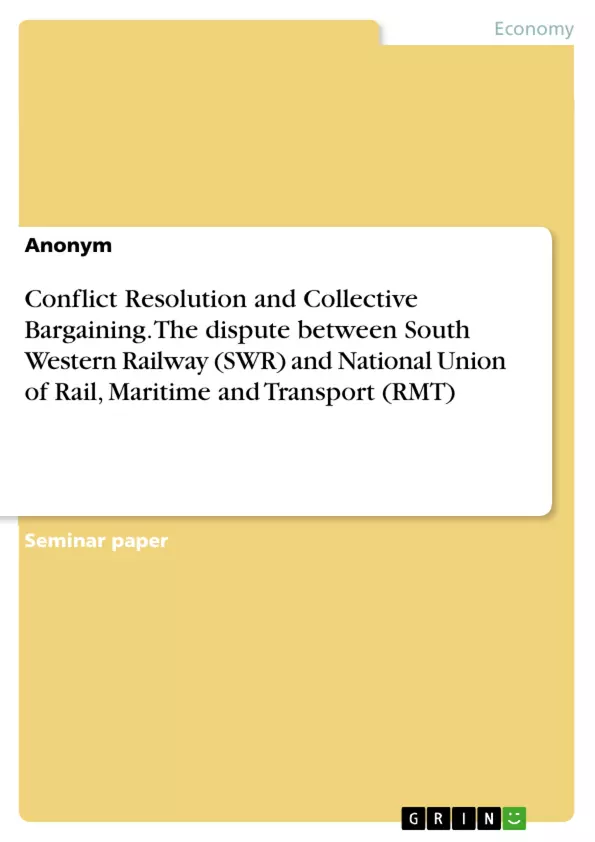Thorugh referring to relevant research evidence and contemporary organisational practice, this research paper critically evaluates a case study report into the dispute between South Western Railway (SWR) & National Union of Rail, Maritime & Transport (RMT).
The details regarding the intentions behind this research paper include a critical examination of the potential implications for dealing with any disciplinary actions against employees. Moreover, a critical evaluation of the role of South Western Railway and the RMT in seeking to resolve the conflict, together with consideration of alternative methods of conflict resolution such as arbitration, conciliation and mediation, a critical evaluation of alternative strategies that South Western Railway might adopt in order to manage its employee relations better in the future, including the costs of getting it wrong.
With the current number of people employed in the UK standing at 32m records of the employment rate are revealed at 76% rate. Aligned to this such employer-employee relations within the workforce are crucial within the HRM context but also shaping wider organisational reputation. Whilst CIPD (2018) ‘people profession’ recognises employee relations (ER) as one of key specialist disciplines across HR adding value towards managing and building a culture of trust through organisational related procedures becomes crucial.
Inhaltsverzeichnis (Table of Contents)
- Introduction
- General overview of employee relations & Trade Union
- Collective Bargaining & Negotiation
- The Dispute
- Implications to the dispute on Psychological Contract and Employee Engagement
- Alternative strategies to conflict resolution
- Conclusions
- Recommendations
- References
Zielsetzung und Themenschwerpunkte (Objectives and Key Themes)
This assignment examines the case study dispute between South Western Railway (SWR) and the National Union of Rail, Maritime and Transport Workers (RMT), critically engaging theories surrounding employee relations, collective bargaining, and negotiation. It explores the implications of the dispute on employee engagement and psychological contract, examines alternative conflict resolution strategies, and concludes with recommendations to prevent future disputes.
- Employee relations and the role of trade unions
- Collective bargaining and negotiation processes
- Impact of the dispute on employee engagement and psychological contract
- Alternative conflict resolution strategies
- Recommendations for preventing future disputes
Zusammenfassung der Kapitel (Chapter Summaries)
The introduction provides an overview of the UK's employment landscape and highlights the significance of employee relations within the HRM context. It also introduces the case study dispute between SWR and RMT and outlines the assignment's focus on examining employee relations theories, collective bargaining, and the dispute's implications on employee engagement and psychological contract. The chapter concludes with a brief discussion of alternative conflict resolution strategies and a promise to provide recommendations for preventing future disputes.
The chapter on general overview of employee relations and trade unions defines employee relations as the alignment between employee experience and organizational values, emphasizing the importance of building trust and positive working relationships. The role of trade unions in protecting workers' rights, improving quality of life, and negotiating with employers through collective bargaining is also discussed. The chapter highlights the importance of effective consultation and communication between trade unions and management in resolving conflict.
The chapter on collective bargaining and negotiation explores the key concepts within employee relations, emphasizing the role of these processes in determining pay, benefits, and other terms and conditions of employment. It defines negotiation as a process of reaching agreement through exploring options and exchanging offers, and collective bargaining as the process where trade unions negotiate on behalf of employees with employer representatives.
The chapter on the dispute provides a detailed account of the ongoing conflict between SWR and RMT over the introduction of driver-controlled operated doors on new trains. The chapter explores both SWR's perspective on improving efficiency and technological advancement, and RMT's concerns about the potential compromise of passenger safety. It also discusses the framework agreement proposed by SWR to RMT, which covers a second person with a 'critical safety role', a safety risk assessment to be conducted collaboratively, and a disruption policy agreement.
Schlüsselwörter (Keywords)
The primary keywords and focus topics of the text include: employee relations, trade unions, collective bargaining, negotiation, conflict resolution, psychological contract, employee engagement, SWR, RMT, driver-controlled operated doors, passenger safety, and dispute resolution.
Frequently Asked Questions
What was the core of the dispute between SWR and RMT?
The dispute centered on the introduction of driver-controlled operated doors on new trains and concerns regarding passenger safety and the role of the second crew member.
What is the role of Trade Unions in this context?
Trade unions like RMT protect workers' rights and negotiate with employers through collective bargaining to improve working conditions and safety standards.
How does such a dispute affect the "Psychological Contract"?
A prolonged dispute can damage the unwritten expectations between employer and employee, leading to lower trust and reduced employee engagement.
What alternative conflict resolution methods are available?
Alternative strategies include arbitration, conciliation, and mediation to resolve disputes without industrial action.
Why is employee relations crucial for organizational reputation?
Positive relations build a culture of trust, while public disputes can harm the brand image and operational efficiency of a company like South Western Railway.
- Arbeit zitieren
- Anonym (Autor:in), 2020, Conflict Resolution and Collective Bargaining. The dispute between South Western Railway (SWR) and National Union of Rail, Maritime and Transport (RMT), München, GRIN Verlag, https://www.grin.com/document/988885



